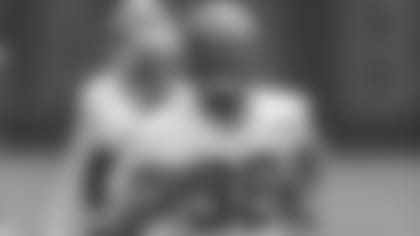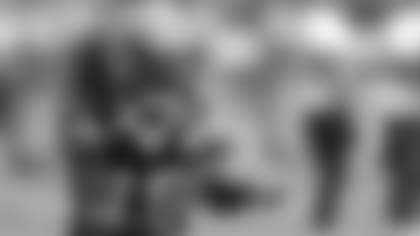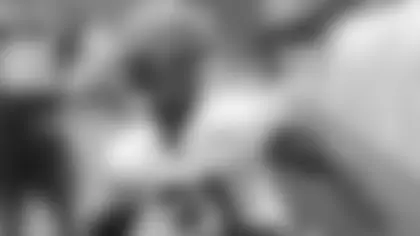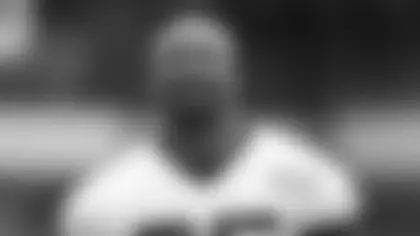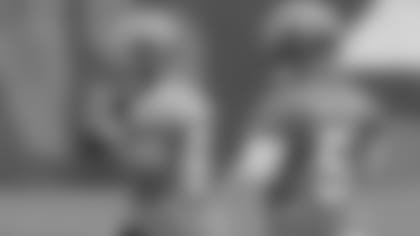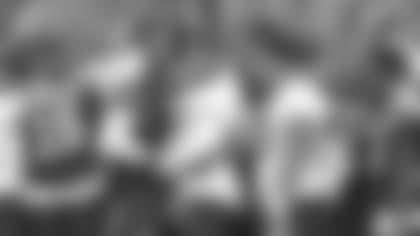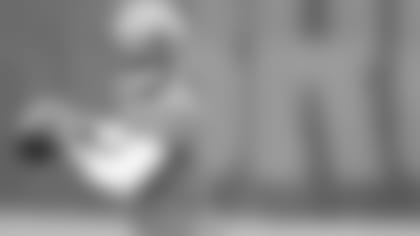Opening statement:
"If anyone's interested, I have my updated quarterback rankings (laughter). Every quarterback that's ever played is tied for one, the best ever (laughter)."
On Seahawks Head Coach Pete Carroll ranking as a head coach:
"The best ever – tied! Tied for the best ever because I don't want to slight anybody else when I slot somebody somewhere (laughter)."
On OL Joe Thomas' status:
"We just finished a walkthrough, and he was heading into the training room so I'll have more of an update heading out. If he goes today, it will be limited, but at this point I don't see anything that's going to keep him out of the game."
On expecting Seahawks DB Richard Sherman to shadow a Browns WR or play one side of the field:
"He could because they've done both so I'm not sure what their plan is. When you say. 'Show me the ideal corner,' it starts to me with his mentality, but the length is what makes him so difficult to get open against. It's just hard, a guy that had that wingspan and the ability to get his hand son receivers early in the down. They take full advantage of the rule about contact within 5 yards. That makes it tough because in the league, most routes are based on timing and a quarterback is going to take his drop and look to a certain spot and want the receiver to be there. A lot of times, they're throwing to windows and anticipating the guy getting there, and that's hard to depend on who is ever to his side, knowing that there is a reasonable chance that they're going to get disrupted at the line of scrimmage."
On describing the decision to sign RB Raheem Mostert and waive WR Darius Jennings:
"Not too deep. When Mostert became available from Baltimore, he was a guy that we had – Tabes (special teams coordinator Chris Tabor) I know, he's a pretty good special teamer first and then has value as a third back. There's a speed element there. It was a tough time for him to become available. We had to make a roster move. (General Manager) Ray (Farmer) and I, we talked about it, and that's the direction we went."
On keeping WR Dwayne Bowe on the roster and waiving Jennings:
"We've talked internally about our players and how we see them, and that's the direction we went."
On if WR Andrew Hawkins could return for the final two games:
"Still not there yet with Hawk. Hopefully, have more information on that sooner than later. There are direct parallels to (DB) Joe's (Haden) situation, just the frustration there of we all know what a competitor Hawk is and how we want to get him back."
On considering placing Hawkins on IR to acquire Mostert:
"We weren't at the point yet where the logical move would have been to shut Hawk down, but we just weren't at that point yet."
On if there is any concern about QB Johnny Manziel's friendship with WR Josh Gordon, given both players' off –field history:
"We stress to our players, not just Johnny but it's all of them, about making it in this business and getting the right people around you. I'm not going to sit here and pile on Josh – his history is documented – and we haven't been able to, by league rule, have a lot of interaction, but from the feedback that we've gotten back that, the returns there are very positive. That will turn out to be a positive thing if Josh is with us next year and Johnny is on the roster that those two have built a rapport together. I could see externally you doing the math and saying that, but as I've said before, we advise our players but we don't micromanage them outside of the building."
On what kind of contact the Browns can have with Gordon:
"Your director of player engagement – for us that's Ron Brewer – is allowed to periodically have contact, but other than that, we are not permitted to."
On if the Browns would welcome Gordon back with open arms if reinstated by the NFL:
"Sure, he's a Cleveland Brown. Absolutely, we would."
On Seahawks WR Doug Baldwin's and other NFL players who are successful when plays break down and chemistry with their QBs:
"Any receiver that's played for (Steelers QB) Ben Roethlisberger –they practice it; you can tell that a lot of their routes as they break down, 'OK, now the play is starting.' Just going back to when he started to make his run, whether it was (former Steelers WR) Hines Ward or any of those guys that they had, they all had a good understanding of [it]. That's something that develops over time, and we encourage our quarterbacks in practice. We'd like to think that all three that we have are guys that can extend plays with their feet. Johnny is certainly known for it more than the other two, but both (QB) Josh (McCown) and (QB) Austin (Davis) and even (QB) Connor (Shaw) have some mobility, and that's something that you do have to work on. If you're just running a drill and everybody's covered, don't just go ahead and end the play there; let's go ahead and work on ours because it's good for us defensively to work scramble drill, where we want to plaster receivers and find the nearest guy and get to him before end zone and all those good things. That's one of the reasons as you study Seattle that their offense has taken a jump because they do such a good job. Baldwin is a perfect example that when that route is not there initially that they're finding ways to extend it, either to flatten out or climb deep, As I said the other day, Wilson's ability to keep his eyes downfield as he's scrambling makes him that much more dangerous."
On if there are rules built in when plays break down:
"Teams will build rules in. If you're on a route that is breaking in or coming back that you're supposed to continue to come back. If you were on a deeper route that you can now track the quarterback across the field. If you ran an out breaking route, once you run out of room to the sideline. go ahead and turn it back up. Coordinators are all different, but for the most part. they'll usually have some general rules for them because every route is different. That's not something you want to over-coach. If a receiver sees the quarterback scrambling and sees a lot of open space in front of him, just go ahead and present a quarterback-friendly target, break to him and let him know where you are. It looks like streetball, but there are teams – I've already used the Pittsburgh example – that have scored a lot of points, gained a lot of yards with that exact thing."
On how coaching changes in louder venues like CenturyLink Field:
"It makes it difficult, even the coaches. Most stadiums, you can get away with on the sideline just the single muff earpiece or headset now. There's a chance that in a loud venue like that that you would maybe have to go to two. It effects the ability to communicate at times. It's tough on you offensively. That's where the issues come up. Making sure that you have to be very precise in your play calls. It's hard then when you start asking for it again and tapping your helmet and the crowd senses that and they get louder. You have to be concise, get it in and be clear and have it communicated and the more condensed your calls can be, not have a lot of moving parts and checks and all that stuff, I think you're doing yourself a favor that way. It does force you to have that mentality. You can't go out and have a gameplan like you would run at home that require s a lot of communication, change in plays, try to get yourself in the perfect play, and you get there and just can't do it because you can't get it communicated."
On how often play calls are wrong because of communication in loud environments:
"It happens. I wouldn't say it's very frequent. We also have it built with the quarterbacks and that's part of their weekly prep is if they don't get the play – more often for us, it's a breakdown and with the issues that the league has had with the headsets – that you have to train your quarterbacks, 'If we're in this personnel grouping and it's this down and distance, what's your go-to play if you don't get one from me?' That way, they have to know the plan well. Also, that's the exercise, too, you find out what their favorite plays are. There might be times when it goes down and coordinators will point, 'Hey, it's on you,' and it's on their preparation to get something called that we can go ahead and run without burning a timeout."
On if the Browns will spend more time on hand signals to prepare this week:
"Yeah, some of our routes. Usually, the way most teams are is when you get in a two-minute when you're going fast and the receivers don't get a chance to huddle up and you have different route combinations that you can signal to them."
On if there are hand signals from the sideline to the QB:
"No. In the helmet – I know its loud but it's not that loud that he just flat – there might be times that he has to cover up to hear it, but the speaker system in the helmets pretty good. It's literally next to your ear. I haven't heard of a case where it was just too loud. I've heard it malfunctioning and you couldn't hear or it was static-y, but I've never heard of a situation where it was just too loud to hear it in the helmet."
On the Browns' talent among pass catchers if potentially returning TE Gary Barnidge, Gordon, WR Travis Benjamin and other veteran WRs:
"I'm focused on the receiving corps this coming Sunday. I know it's good to project and you're getting towards the end of the year and the tendency is to start to look forward, but you can afford to do that. I can't."
On the likelihood Manziel and Gordon will play together in Cleveland next year:
"Again, that's just hypothetical, trying to project it to next year. Those are all questions that will get answered sooner than later. My sole focus is this weekend."




